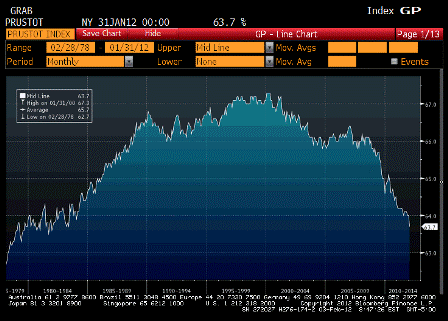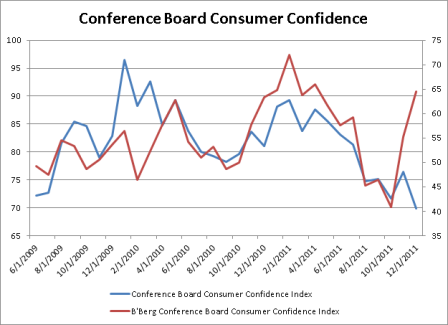Reads like inflation fears are still there which should temper growth initiatives:
China economy faces downward risks in 2012
Feb 1 (Reuters) — China’s economy faces downward risks in 2012, as weakening external demand cuts into growth of the country’s export sector, the Finance Minister Xie Xuren said in remarks published on Wednesday.
He also said inflationary pressures in China remain strong as international markets are awash with cash, which has helped push up global commodity prices.
“There exists some downward pressure for the economic growth. As the external demand is now fading clearly, Chinese exporters are facing increasing difficulties,” Xie said in an article published in the ruling Communist Party’s mouthpiece magazine, Seeking Truth, which was posted on the central government website, www.gov.cn.
China’s economy, which grew at its weakest pace in 21/2 years in the latest quarter, looks to be heading for an even sharper slowdown in coming months, although an official survey of purchasing managers showed a slight upturn in factory production in January.
Xie also emphasized the important role of fiscal policy in maintaining China’s steady and relatively fast economic growth and said Beijing would continue to implement a proactive fiscal policy this year.
China’s fiscal deficit and government debt ratio, both of which remain within a safe and comfortable zone, are expected to give much scope for the government to keep its proactive fiscal policy, Xie added.
China’s nationwide fiscal revenues jumped 25.8 percent to a record high of 10.37 trillion yuan in 2011, leaving the country with a fiscal deficit of 519 billion yuan, lower than the budgeted 900 billion yuan.
“It is necessary and also possible for us to continue to implement a proactive fiscal policy,” he said. Xie also said that his ministry would provide more fiscal support to small to mediumsized enterprises and step up efforts to cut taxes for some selected sectors to restructure the economy away from exports and towards domestic consumption. “We will further improve tax cut policies in some areas to promote the development of enterprises and boost household consumption,” he added. Beijing has unveiled a slew of tax breaks to help cashstrapped small firms cope with rising costs and has also allowed them to issue more bonds and tap other sources of financing to ease the funding squeeze. The finance ministry also vowed to guarantee enough funding for key construction projects in the 12th five year plan period. Chinese Premier Wen Jiabao also said at a state council meeting on Tuesday that the central government would back funding to major projects already under way to ensure steady growth in investments.
China 2012 Budget Deficit May Rise Slightly
Feb 1 (Bloomberg) — China’s budget deficit may rise slightly or be almost unchanged this year from 2011, Gao Peiyong, a researcher with the Chinese Academy of Social Sciences, wrote in a commentary in today’s People’s Daily.
China may control fiscal expansion this year as maintaining consumer prices is a main problem for the country, Gao wrote
China may cut tax, rather than increase spending to continue conducting positive fiscal policies, according to Gao.
Feb 1 (Bloomberg) — China’s economic fundamentals remain sound and the country has some advantages that will promote development this year, Finance Minister Xie Xuren wrote in Qiushi article posted on the central government’s website today.
China has “huge” domestic demand potential, Xie writes
China still faces downward pressure on economic growth, “relatively large” inflationary pressure and potential economic and financial risks, Xie writes
China’s deficit rate and debt rate are in a “safe range,” Xie writes
China Says it Will Implement Proactive Fiscal Policy This Year
Feb 1 (Yonhap) — China said Wednesday it will implement a proactive fiscal policy this year in a bid to drive up growth amid growing signs of a global economic slump.
Chinese Minister of Finance Xie Xuren, said in a statement that the government will use financial functions to maintain stable and rapid economic development in China.
China’s economic growth slowed last year, with its gross domestic product growing 8.9 percent on-year in the fourth quarter, slowing from 9.1 percent in the third quarter and 9.5 percent in the second quarter.
Over the course of the year, China’s economy expanded 9.2 percent in 2011 from a year earlier, down from 10.3 percent on-year growth in 2010.
Xie noted that China’s economy is facing downward pressure stemming from external shocks.
“The country’s exports are facing increasing difficulties, affected by significantly weakening external demand,” he said. “New drivers for economic growth need to be developed.”
The country’s export growth has begun slowing on falling global trade.
With global economic uncertainty lingering, including the European fiscal crisis, China has been looking to transform itself into a consumption-oriented economy by raising domestic demand.


